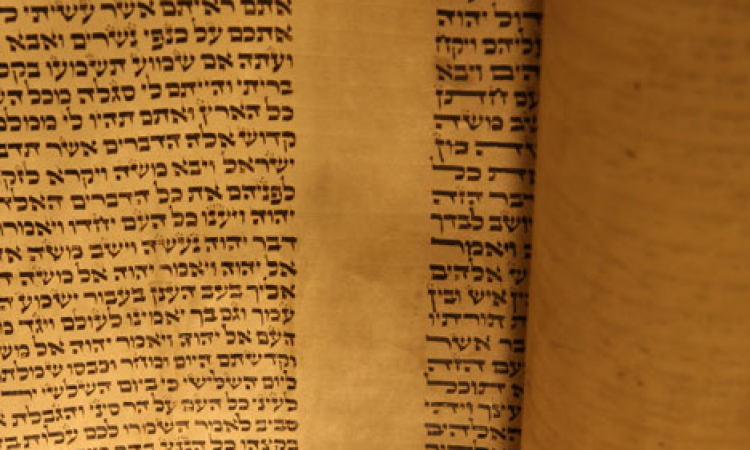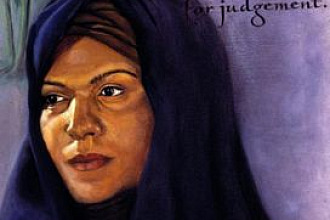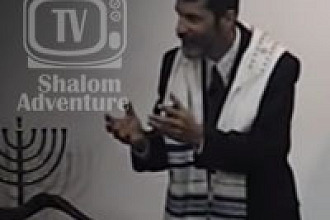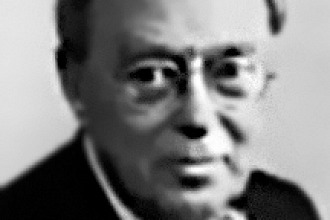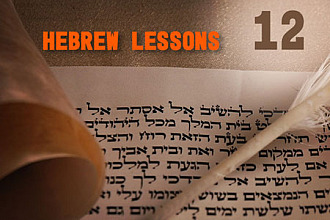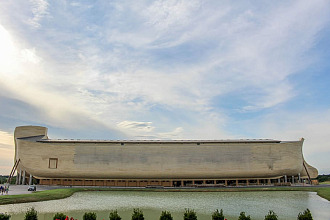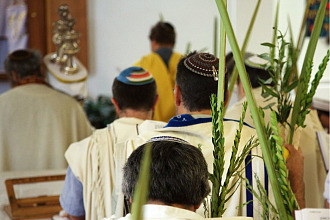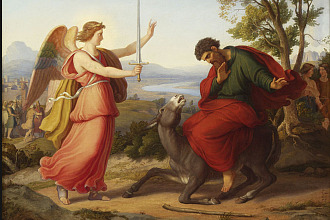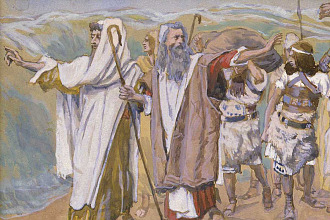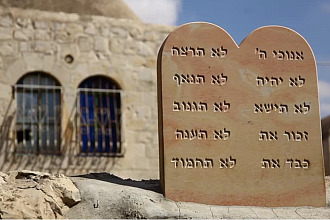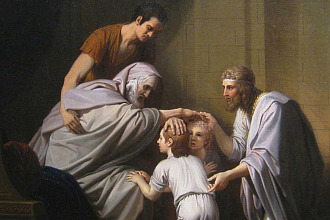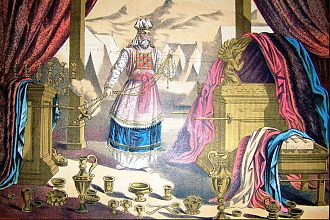Parasha for the Week: Ki Tavo Deuteronomy 26:1 – 29:8
Haftara for the Week: Isaiah 60:1 - 22
Apostolic Writings: Hebrews 7
Overview
When Bnei Yisrael dwell in the Land of Israel, its first fruits are to be taken to the Temple and given to the kohen in a ceremony expressing recognition that it is G-d who guides the history of the Jewish People throughout all ages.
With this mitzvah Moshe concludes the commandments that G-d has told him to give to the Jewish People. Moshe exhorts them to walk in G-d’s ways, because they are set aside as a treasured people to G-d.
When Bnei Yisrael cross the Jordan River they are to make a new commitment to the Torah.
Huge stones are to be erected and the Torah is to be written on them.
Half the tribes will stand on Mount Gerizim, and half on Mount Eval, and the levi’im will stand in a valley between the two mountains. There the levi’im will recite 12 commandments and all the people will answer “amen” to the blessings and the curses.
Moshe then details the blessings that will be bestowed upon Bnei Yisrael. These blessings are both physical and spiritual. However if the Jewish People do not keep the Torah, Moshe details a chilling picture of destruction, resulting in exile and wandering among the nations.
"Bikurim or First Fruits"
Parashat Ki Tavo begins with the commandment of Bikurim (first fruits). Let’s remember first that for the Jewish people all the mitzvoth which are about the land, or agriculture apply only in the land of Israel and not when the Jewish people are in exile. However, in the Gemarah there is a modern application of this law saying: “When someone brings a present to a talmid chacham (Scholar dedicated to study the Torah) it is as though he brought bikkurim.” (Bogomilsky)
The mitsvah of Bikurim was considered as a thanksgiving feast. It was about thanking Hashem for all his blessings in the Land of Israel. That is why this mitzvah should be practiced only in the Land of Israel. In fact, according to the tradition, the mitzvah of Bikurim didn’t apply immediately upon entering into the promised land, but 40 years later —at the end of Joshua leadership—after they conquered the land and gave everyone their assigned land. A question asked here is why those who received their piece of land earlier had to wait for the other to get their land before practicing this commandment? The answer is that this mitzvah of Bikurim is an expression of joy; “You will rejoice in all the good that HASHEM your God has given to you and to your house—you, the Levite, and the outsider in your midst.” (Deuteronomy 26:11). Thus, all the people together should rejoice, not some rejoicing while some other were in war to conquer their piece of land. The spirit of Ahavat Yisrael, (love of Israel) is behind this waiting. One cannot have complete joy, even when they have everything they need, knowing that one of his brethren is still lacking, because they don’t have their land yet. Thus, the mitzvah applied only 40 years after coming into the Promised Land and every family can rest and rejoice in Hashem for his blessings.
This speech of gratitude (Deuteronomy 26:5-10) which is pronounced in the singular first person is a review of the great events of the Exodus. Even though later these events took place hundreds or thousands of years in the past, each one has to pronounce them as if they related directly to him in his own life. The believer speaks of the land that “You have given me.” The earth belongs to G-d wherever I am living; each piece of land that belongs to me has been given to me, and I am to give thanks for each blessing I receive from this piece of land. Rabbi Zelman Marozov says that Once in Jerusalem, the basket of fruit was given to the Cohen. The person bringing the basket of fruit would thank G-d for taking the people of Israel out of slavery in Egypt, for all the miracles which G-d has done for the Jewish people, and for bringing us to this place and giving us this land, a land that flows with milk and honey. (Torah.org).
This process of thanksgiving or Bikurim was to take some of the first-fruits of every production and to bring them in the place that Hashem had chosen, first it was where the Sanctuary was and after the moving of the Sanctuary in Jerusalem, the bikurim where brought to Jerusalem and given to the Cohanim (priests). When the basket of the bikurim were given to the priests, the Israelite had to start the recitation of all God’s blessings upon him and his people: “The kohen is to take the basket from your hand and set it down before the altar of HASHEM your God. “Then you are to respond before HASHEM your God, ‘My father was a wandering Aramean, and he went down to Egypt and lived there as an outsider, few in number. But there he became a great nation—mighty and numerous etc…” (Deuteronomy. 26:4–5). The prayer refers to the miracle of the survival of Jacob while he could be assimilated to the people of Laban and the people of Israel would have disappeared, but he survived the manipulations and attempt of Laban to destroy him and his family. Thus, bringing of the first-fruits was accompanied by his acknowledgment of G-d’s deliverance in saving the nation from destruction. It is clear that reading the Torah we discover that G-d performed many more miracles than saving Jacob from Laban or Israel from Egypt. But these two miracles are the founding miracles of the people of Israel, they were the two occasions when Israel were threatened of extermination and including these two events in the prayer allowed Israel to remember what the nations are able to do against G-d’s people.
This text and the following verses are part of what the Jewish people also recite on the Seder of Passover or the Hagaddah. The purpose of this declaration was to remember the great miracles of God in God’s people history and to identify himself with the Exodus and the miracles as if they happened to him personally, during his life, even though a thousand years separate him from the original event.
A person can only be truly happy if he appreciates what Hashem has given him. However, if a person is egocentric, considering himself deserving of all that he has, he will not be happy about what he has. Rather, he will be focused on those things which are not yet his, but to which he feels entitled. If a person goes through life with the attitude that everyone owes him, he will constantly be miserable, never satisfied with what he has.
The mitzvah of Bikurim teaches us that before we enjoy the bounty and blessings which God gave us, we must first give back what belongs to G-d. This is accomplished by giving tithes and offering to the Temple for the service of the Cohanim and also to Tzedakah which is a provision for the poor, orphan, widows and needy. These acts of goodness and kindness is not only the right thing to do, it is also a gateway to happiness.
How do we feel today? Happy or unhappy? Many times happiness or unhappiness is a state of mind. If we are satisfied with the blessings of Hashem in our lives, then we will be happy, but if we think that we will be happy only when we will have more, then we will never be happy because we would never be satisfied with what we have. If we think that we will be happy only when we have more, then we will never be happy. We can only be happy if we appreciate what we have and what we are doing. In Pirkei Avot, we read: “Who is the rich one?...He who is happy with his lot.” (4:1). Rabbi Pliskin says: “Regardless of what you have, you are only wealthy if you have mastered the ability to appreciate what you have.” (aish.com). According to the Torah, true wealth is measured in terms of happiness. (aish.com)
The mitzvah of Bikurim teaches us that before we enjoy the bounty and blessings which G-d gives us we must give back some of what we have. Unless one is thankful for his blessings, he still be depressed. Imagine all the people who were blessed by Yeshua when it is written: “the blind see and the lame walk, those with tzara’at are cleansed and the deaf hear, and the dead are raised and the poor have good news proclaimed to them.” (Matthew 11:5), if we were one of this man or woman we would be among the happiest person in the world, thus, Why wait to appreciate what we have? It is time to count all the goodness and blessings we have received from Hashem
mitsvah which warns them, in a positive way, to remember Hashem and His commandments. It is not the first time that Moshe gave this command—he had previously included it in the book Bamidbar (Numbers 15): “HASHEM spoke to Moshe saying, ‘Speak to Bnei-Yisrael. Say to them that they are to make for themselves tsitsit on the corners of their garments throughout their generations, and they are to put a blue cord on each tsitsit. It will be your own tsitsit—so whenever you look at them, you will remember all the mitsvoth of HASHEM and do them and not go spying out after your own hearts and your own eyes, prostituting yourselves. This way you will remember and obey all My mitsvoth and you will be holy to your God. I am HASHEM your God. I brought you out of the land of Egypt to be your God. I am HASHEM your God’” (37-41). If many of these Orthodox Jews want the tsitsit to be visible, it is because the verse says: “so whenever you look at them, you will remember all the mitsvoth of HASHEM.” Every time a believer sees these tassels, he is to remember that he is a member of Hashem’s people, and should behave differently than the average secular person walking down the street—believers are to witness for Hashem by keeping His commandments.
"Yisrael and Tithes"
The Jewish people had a cycle of seven year to help them counting the Sabbatical year, which was the seventh year of the cycle. This cycle of seven years helps them also know when to give Ma’aser or tithe to the proper people.
In our parashah the Torah gives some instructions about a second and third Tithes which were different of the first tithe given to the Temple exclusively for the Cohanim: “When you finish tithing the full tenth of your produce in the third year, the year of the tithe, you are to give it to the Levite, to the outsider, to the orphan and to the widow, so that they may eat within your town gates and be satisfied. Then you are to say before ADONAI your God, ‘I have removed the holy tithe from my house and also have given it to the Levite and to the outsider, to the orphan and to the widow, according to all Your mitzvah that You have commanded me. I have not transgressed or forgotten any of Your mitzvot.” (Deuteronomy 26:12–13). Through this text we understand that in addition to the regular tithe put aside and given to the levites and Cohanim on the third year, a second and a third tithes shall be set aside. In the practice, the Jewish people put aside the second tithe every first, second, fourth, and fifth year of the seven-year cycle, this tithe was dedicated to feed poor and to be distributed to the widows and orphans, while the third tithe gathered every third and sixth year of the seven-year cycle was dedicated to finance the pilgrimage feasts. That is why the owner of this tithe had the obligation to consume it in the city chosen by G-d and where the Sanctuary was. Without this provision of the third tithe, it would be difficult for Jews to make the travel from their home to Jerusalem.
To summarize this we can say that: the three tithes put aside by the Yisraelites from their income were: 1) Ma’aser Rishon (first tithe) for the Levites; 2) Ma’aser Sheni (second tithe) for the poor, which teaches them to appreciate the purposes to which their assets should be directed – these purposes are the cultivation of the spirit, the care of the body and cultivation of loving our fellow men; and 3) the Ma’aser Shlishit (third tithe) for pilgrimages – tithes which had to be consumed in Jerusalem. It is interesting to notice that three thousand and five hundred years ago, the Jewish people already knew how to finance their vacations in Jerusalem!
HAFTARA Isaiah 60:1 - 22
This Shabbat is the sixth Shabbat after Tisha B’Av in the period called Shiva D’nechemta—“Seven weeks of comfort.” Our text of comfort this week describes the future glory of God’s people, when Hashem will shine upon them through His shechinah or Ruach Hashem (Holy Spirit) to witness their discovery of the glorious Messiah and His goodness for humanity. “Arise, shine, for your light has come! The glory of Hashem has risen on you” (Isaiah 60:1). The glory of God’s people will be revealed only when the “glory of Hashem” rises upon them.
The metaphor of light is very important in Scripture. This, is also affirmed at the end of our Haftarah when Isaiah proclaims: “No more will the sun be your light by day, nor the glow of the moon be your light, but Hashem will be your everlasting light, and your God for your glory” (Isaiah 60:19). Light is used metaphorically to describe the mission of God’s people: “I will keep You and give You as a covenant to the people, as a light to the nations” (Isaiah 42:6) – shining and reflecting the glory of the Lord is the mission of God’s people. This was also confirmed by Yeshua saying to his talmidim that they are the light of the world (Matthew 5:14-16) even though we should admit that throughout the centuries the body of believers has not always shined in a good way.
Light is also a symbol of the Torah or the Bible itself. Psalm 119, the longest psalm and chapter of the Bible, is entirely dedicated to magnifying the Torah and broadly the entire revelation, the Bible, as God’s word. The Psalmist affirms: “Your word is a lamp to my feet and a light to my path.” (119:105). Interestingly, light is also used in both the Bible and Jewish tradition as a symbol of the Messiah, and we could say even more than a symbol, as the Messiah is presented as the personification of light, even of the primordial light at the creation (John 1:7-9 and Bereishit Rabbah 25).
This primordial light at the beginning (Genesis 1:5-7) cannot be confused with the light given by the sun created on the 4th day of creation (Genesis 1:14-19). In our Haftarah text, this light has almost been removed from the earth: “For behold, darkness covers the earth, and deep darkness the peoples” (Isaiah 60:2a) – this is the darkness of error, idolatry and apostasy. Light and darkness in the Bible are also metaphors for spirituality (light) or obscurity (darkness – the absence of light), and it is the role of God’s people to bring back the light of God and spirituality on the earth: “But Hashem will arise upon you, and His glory will appear over you” (60:2b). The testimony of God’s people will attract nations and kings to them and ultimately to God: “Nations shall come to your light, and kings to the brightness of your dawn” (60:3). Rabbi David Altshuler in Metzudot affirms, “And His glory will be seen upon you, His shechinah will be manifested in you.” Such an experience happened when the talmidim of Yeshua received the Ruach Hakodesh (Holy Spirit) a few days after Yeshua ascended to heaven: “When the day of Shavuot had come, they were all together in one place. Suddenly there came from heaven a sound like a mighty rushing wind, and it filled the whole house where they were sitting. And tongues like fire spreading out appeared to them and settled on each one of them. They were all filled with the Ruach ha-Kodesh and began to speak in other tongues as the Ruach enabled them to speak out” (Acts 2:1-4). On that day and for the next few years, the light of God illuminated Jerusalem. But the inhabitants of Jerusalem missed a great opportunity, that of seeing the nations coming to them in order to receive the Torah: “Nations shall come to your light” (Isaiah 60:3). Instead, it was Yeshua’s talmidim (disciples) who were dispersed out among the nations to bring the light of God to the nations.
APOSTOLIC WRITINGS: Hebrews 7
One of the laws of the parasha Ki-Tavo is the law of “tithe.” Technically “tithe” is a one-tenth part of income, paid as a contribution to the priests or Cohanim in order to provide to their living. Thus, the people of Israel were asked to give ten percent of their incomes to the priest (Deut 26:12). The collection of tithes was a little complicated because collected in the Sabbatical cycle of years (cf. parashah comment). However, when we read the Torah we discover that tithing is not a Mosaic law, but a law which preceded the levites and Moses. Tithing was already mentioned in the book of Genesis, it was part of the priesthood of Melchizedek (Gen 14:18–20). Reading the letter of Hebrews we discover that the tithe system belongs too, to the priesthood of Yeshua, who has been established by God as the High Priest of the renewed covenant. “Therefore, since we have a great Cohen Gadol who has passed through the heavens, Yeshua Ben-Elohim,” (Hebrews 4:14).
The letter to the Hebrews teaches that Yeshua who is not a descendant of Aaron, has been made Cohen according to the priesthood of Melchizedek, about whom the author of this letter said: “For this Melchizedek, king of Salem, priest of the Most High God, met Abraham returning from the slaughter of the kings and blessed him, and to him Abraham apportioned a tenth part of everything. He is first, by translation of his name, king of righteousness, and then he is also king of Salem, that is, king of peace. He is without father or mother or genealogy, having neither beginning of days nor end of life, but resembling the Son of God he continues a priest forever.” (Hebrews 7:1–3). Melchizedek was made in the likeness of Yeshua, in the book of Genesis, he is symbolically representing Yeshua the Mashiach. We don’t know anything about Melchizedek. We don’t know who was his father or mother, when he was born and when he died.
Why this presentation of Melchizedek, because he was symbolically the representative of Mashiach, he was made like the Messiah who is presented in the Bible as coming from eternity, “But you, Bethlehem Ephrathah— least among the clans of Judah— from you will come out to Me One to be ruler in Israel, One whose goings forth are from of old, from days of eternity.” (Micah 5:1). Being from the days of eternity, means his days are mixed up with eternity, the proper of eternity is no beginning and no end, that means if the days of the Messiah are the days of eternity, he has no beginning and no end, that is why Melchizedek in the book of Genesis has no beginning and no end as the letters to the Hebrews: “For this Melchizedek was king of Salem, Cohen of God Most High. . . . by the translation of his name, he is “King of Righteousness”; and then also King of Salem, which is “King of Shalom.” Without father, without mother, without genealogy, having neither beginning of days nor end of life but made like Ben-Elohim, he remains a Cohen for all time.” (Hebrews 7:1–3). That is why he was considered as a great man by the early movement of Yeshua. The text continues saying: “See how great this man was to whom Abraham the patriarch gave a tenth of the spoils!” (Hebrews 7:4). That means Melchizedek was greater than Abraham our father. The text explains that if Abraham gave his tithe to Melchizedek, it is because Abraham considered Melchizedek as the Cohen Gadol (high priest) of his time, serving the Most High and as superior to him. Thus, since Yeshua came to earth and was ordained to his ministry by a levite (John the Baptist) the priesthood passed from the tribe of Levi to Yeshua, who is priest according to Melchizedek for eternity. Yeshua is the real “king of righteousness” and “king of Shalom.” Righteousness and Shalom can be obtained and achieved only through Yeshua HaMashiach.
This seems complicated, but let’s remember that all the services in the Sanctuary and the Temple were to serve as an illustration of the ministry of the Messiah. The Levite system was established only to teach the people of Israel about the Messiah, as soon the Messiah came, the priesthood was transferred to him and the service in the earthly temple was not necessary anymore. And as Hebrews said that when there is a new priesthood the law had to change too, “For when there is a change in the priesthood, there is necessarily a change in the law as well.” (Hebrews 7:12). Coming back to the mitsvah of ma’aser (tithe) described in the text of Parashah Ki-Tavo among many others we can say that according to the Torah the tithe had to be given to the Levites, since the coming of Yeshua the Leviticus system was fulfilled by Yeshua, new rules must apply under the renewed covenant. In the absence of the temple and levites, tithes should be used to serve the new community to share the gospel of Yeshua. Rabbi Shaul was thinking about the need of Gospel’s workers who gave up everything to run the world to preach the gospel.
Shaul, who was the main shaliach (sent) never asked for any money or privilege for himself for the work he did. But he was aware of the needs of the Gospel’s workers and affirmed: “So also the Lord ordered those who proclaim the Good News to get their living from the Good News.” (1 Corinthians 9:14). Where did the Lord commanded that “those who proclaim the Good News to get their living from the Good News.” Not in the Apostolic Writings, thus the only command we have in the Bible about “this” mitsvah is: “To the Levites I have given every tithe in Israel for an inheritance, in return for their service that they do, their service in the tent of meeting,” (Numbers 18:21). Tithes were given to the Levites, for their service, and their services was in the Sanctuary, in the Temple and in their cities to teach the God’s will to everyone. They were those who proclaimed the “good news” in the time of the Tanach. Thus, Rabbi Shaul took this “mitsvah” from the Lord of the Hebrew Bible and applied it to those who proclaimed the good news at his time. Thus today, we have the right to interpret this text applying it to the pastors/teachers of today who proclaim the gospel full-time. Being faithful to the Torah is not to say: “there is no more Cohanim anymore, then we don’t have to tithe.” Being faithful to the Torah is to actualize his teaching to the current situation. Who are those who teach God’s will? Who are those who serve Hashem? Those are God’s servants who deserve to be paid from the tithe of God’s people. If we want to be faithful to the Torah and to the mitsvoth, we should learn from Rabbi Shaul. Thus as the letter to the Hebrews said: “do not neglect our own meetings” (10:25), it is at this meetings that we should bring our tithes to Hashem.

